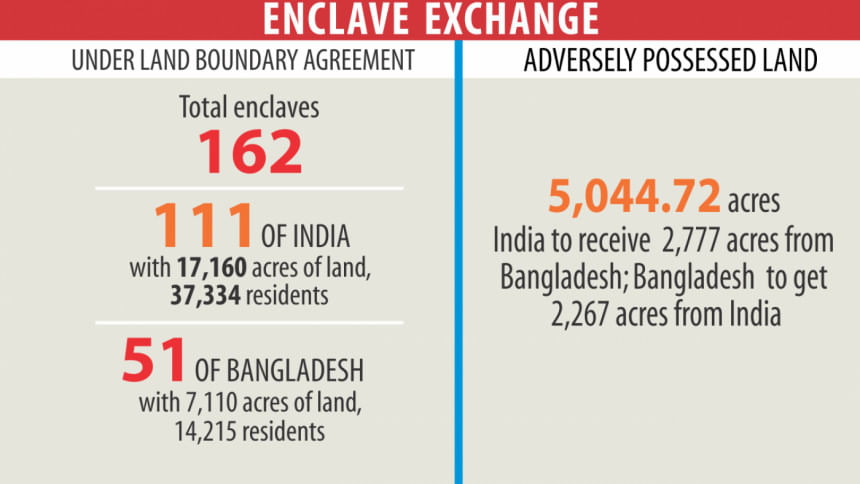Land boundary bill gets thru'

In a rare display of unanimity, India's Rajya Sabha yesterday passed the landmark constitution amendment bill to ratify the long-pending Land Boundary Agreement with Bangladesh.
The bill, which will allow operationalisation of the 1974 Indo-Bangla deal and its protocol in 2011, got through the Upper House of the Indian parliament with full support from 181 members.
There was complete agreement in the House after its members had a nearly two-hour discussion on the issue.
The bill will be taken up today by the Lok Sabha, the Lower House of the Indian parliament, for passage.
Dhaka has welcomed the passage of the bill in the Rajya Sabha, and said it will help enhance further bilateral cooperation between the two nations.
"I congratulate the Indian external affairs ministry and the Indian parliament for their initiatives towards implementation of the agreement in full," Bangladesh State Minister for Foreign Affairs Shahriar Alam told reporters at the foreign ministry.
While piloting the bill for passage, Indian External Affairs Minister Sushma Swaraj said, "This is a historic situation. We are going to implement the agreement after 41 years. I am happy that everyone supported the bill."
Swaraj hoped that following the bill's passage, India's ties with Bangladesh would go back to the level of what existed in 1971 after the creation of Bangladesh.
On the BJP's opposition to the bill when Congress-led UPA was in power, she said "Earlier we had opposed it… We were told to include Assam, which has been done."
Contending that the agreement would benefit both India and Bangladesh, Swaraj said the Indian home ministry would be the "nodal ministry" for implementing the LBA.
"We are aware of the complexities involved in implementation of the agreement. The earlier we implement [the agreement], sooner we reap the benefits," she said.
The LBA was signed in 1974 but was not ratified by India as it involved transfer of territory which required a constitutional amendment.
The bill on the LBA aims at giving effect to acquisition of territories by India and transfer of territories to Bangladesh and exchange of enclaves in line with the 1974 agreement.
The territories in Assam, West Bengal, Tripura and Meghalaya come under the ambit of the bill.
The bill will be placed in the Lok Sabha today where too it needs to be passed with two-thirds majority. It will also have to be okayed by legislatures of the states concerned -- West Bengal, Meghalaya, Tripura and Assam.
Once the Lok Sabha passes the bill to complete the seal of approval by both Houses of parliament, the green signal from the states' legislatures is a mere formality.
The bill also provides that the Indian government may, by issuing notification in official gazette, set the date for acquisition and transfer of territories.
The Bharatiya Janata Party, Asom Gana Parishad and Trinamool Congress had opposed the bill when it was brought by the United Progressive Alliance (UPA) government in 2013.
On September 6, 2011, protocol to the agreement concerning demarcation of land boundary between India and Bangladesh and related matters to the LBA was signed during then Indian Prime Minister Manmohan Singh's visit to Dhaka.
The constitution amendment bill to operationalise the agreement was introduced first in the Rajya Sabha in 2013 but couldn't be passed due to stiff opposition.
When the Narendra Modi government came to power, the bill was again sent to the standing committee on the external affairs ministry.
The bill refers to demarcated land boundaries in accordance with the 1974 agreement which underwent further modification through letters exchanged thereafter and the 2011 protocol.
Swaraj noted that the government would ensure Indians moving to Bangladesh would enjoy "dignified life", and said there wouldn't be any "demographic change or exchange", and people from either side can avail citizenship if they wish under the exchange of 161 enclaves between the two countries.
Meanwhile, Asom Gana Parishad called a 10-hour Assam bandh from 6:00am today to protest against the inclusion of the state in the LBA.
In a statement, AGP General Secretary Kamalakanta Kalita criticised the BJP and the Indian government for their "surrender" to Bangladesh.
FACTS ABOUT LBA
The LBA has three components. One is un-demarcated land boundary of approximately 6.1 km in three sectors in Bangladesh's Nilphamari and India's West Bengal, Muhuri River in Bangladesh's Feni and Belonia in India's Tripura, and Lathitila-Dumabari in Bangladesh's Moulvibazar and India's Assam.
The other two are exchange of 162 enclaves and over 5,000 acres of adversely possessed land.
India will transfer 111 enclaves with 17,158 acres of land and a population of 37,369. The enclaves are spread across four districts in Bangladesh -- 12 in Kurigram, 59 in Lalmonirhat, four in Nilphamari and 36 in Panchagarh.
The 51 Bangladeshi enclaves, all located in Cooch Behar of West Bengal, have 7,110 acres of land and population of 14,215.
Once the exchange is done, Bangladesh will have a net gain of around 10,000 acres of land.
The exchange of enclaves will fulfil a major humanitarian need to mitigate the hardships that the enclaves' inhabitants had to endure for over six decades for lack of basic amenities and facilities.
In respect of adversely possessed land, India will get 2,777.038 acres and transfer 2,267.682 acres to Bangladesh.

 For all latest news, follow The Daily Star's Google News channel.
For all latest news, follow The Daily Star's Google News channel. 



Comments